1. Setup
1.1 Package Contents
Ensure all items are present in the package:
- Keychron M6 Wireless Gaming Optical Mouse
- USB Type-C to Type-A Cable
- USB Type-C 2.4 GHz Receiver
- USB Type-A 2.4 GHz Receiver
- User Manual
1.2 Charging the Mouse
Before first use, fully charge the mouse using the provided USB Type-C to Type-A cable. Connect the Type-C end to the mouse and the Type-A end to a USB port on your computer or a USB power adapter. The LED indicator will show charging status.
1.3 Connecting the Mouse
The Keychron M6 supports three connection modes: 2.4 GHz wireless, Bluetooth 5.1, and wired USB.
2.4 GHz Wireless Connection
For optimal performance, use the 2.4 GHz wireless connection. This mode offers low latency and quick response.
- Locate the mode switch on the bottom of the mouse and set it to 'G' (Gaming/2.4 GHz).
- Plug either the USB Type-C 2.4 GHz receiver or the USB Type-A 2.4 GHz receiver into an available USB port on your computer.
- The mouse should automatically connect. If not, press the pairing button on the bottom of the mouse.

Image: Keychron M6 mouse shown with its two types of 2.4 GHz wireless receivers, USB-C and USB-A, illustrating the wireless connectivity options.
Bluetooth 5.1 Connection
For general use and multi-device connectivity, use Bluetooth.
- Locate the mode switch on the bottom of the mouse and set it to 'B' (Bluetooth).
- Press and hold the Bluetooth pairing button on the bottom of the mouse until the LED indicator starts blinking rapidly.
- On your computer or device, go to Bluetooth settings and select 'Keychron M6' from the list of available devices to pair.
- The mouse supports up to 3 Bluetooth devices. Use the '1', '2', '3' buttons on the bottom to switch between paired devices.
Wired USB Connection
For a stable, zero-latency connection, use the wired mode.
- Connect the provided USB Type-C to Type-A cable to the mouse and your computer.
- Locate the mode switch on the bottom of the mouse and set it to 'OFF'. The mouse will automatically switch to wired mode.
1.4 Initial Software Setup (Keychron Engine)
To unlock full customization, download and install the Keychron Engine software from the official Keychron website. This software allows you to modify key assignments, set shortcuts, adjust RGB lighting effects, and create dedicated macros.
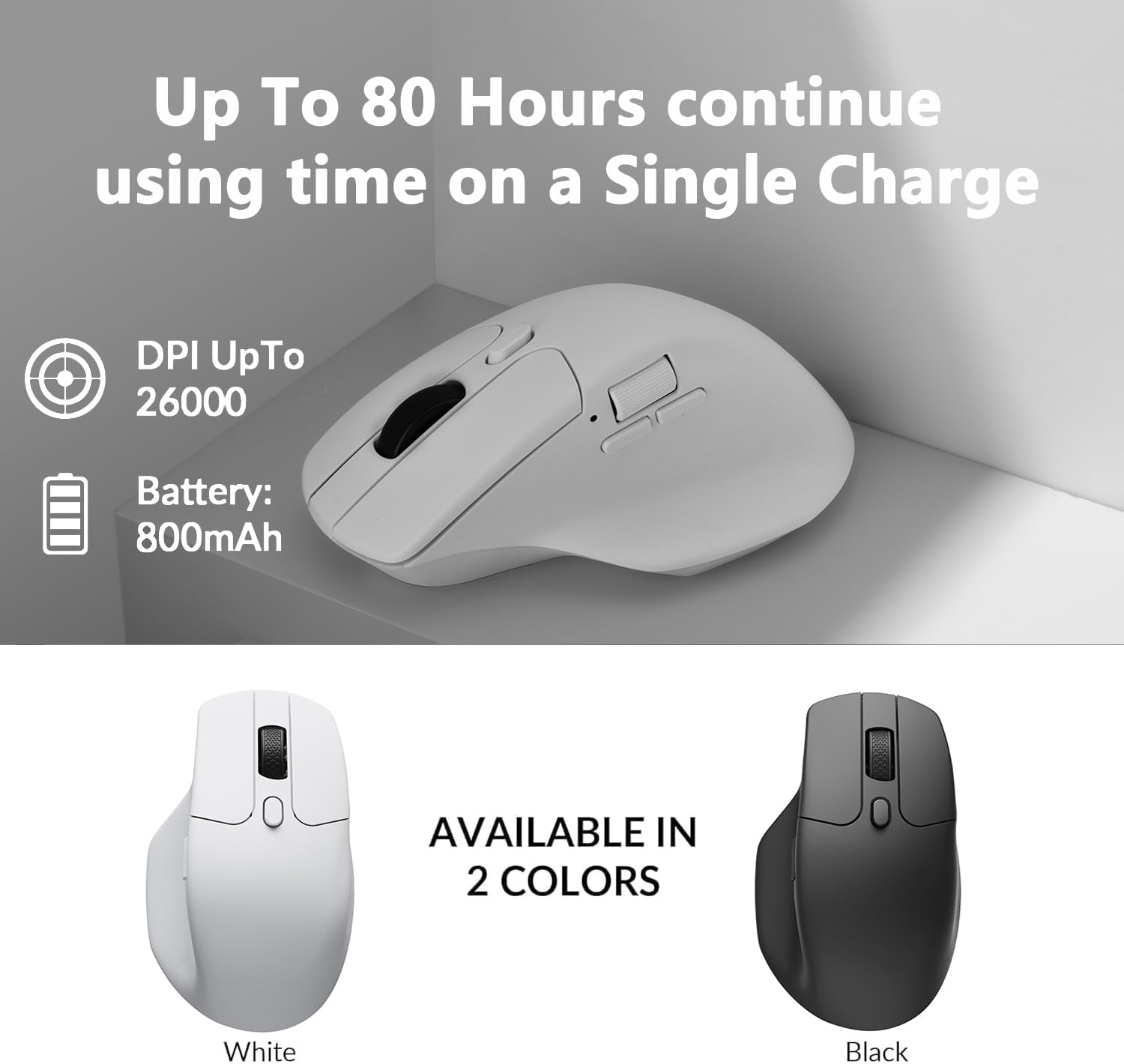
Image: Screenshot of the Keychron Engine software interface, demonstrating the customization capabilities for the M6 mouse, including button remapping and profile management.
2. Operating the Mouse
2.1 Basic Functions
The Keychron M6 features standard left and right click buttons, a scroll wheel, and additional programmable buttons for enhanced productivity and gaming.
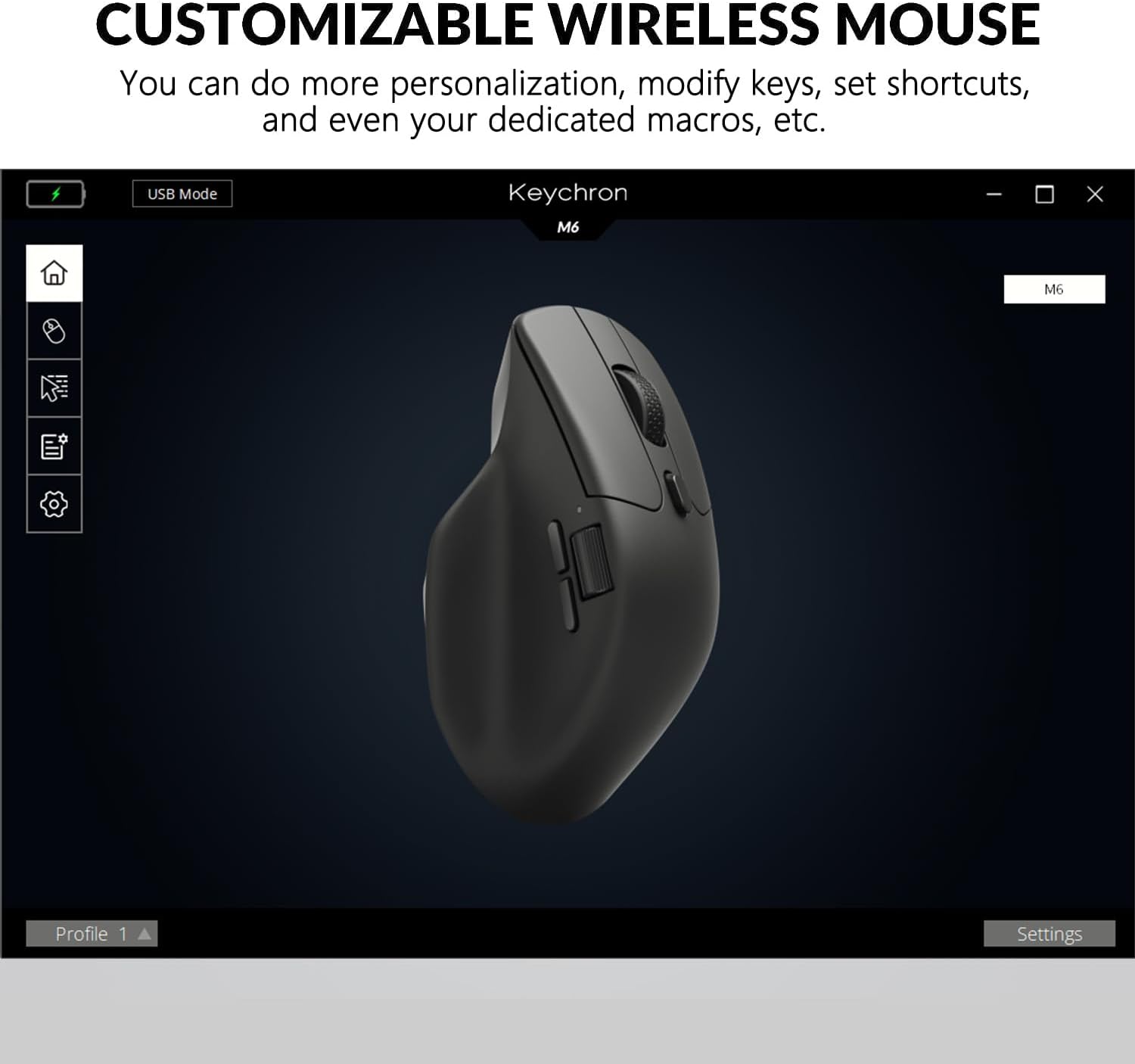
Image: The Keychron M6 mouse positioned on a wooden desk alongside a mechanical keyboard, illustrating its ergonomic design in a typical workspace setup.
2.2 DPI Adjustment
The M6 features a PixArt 3395 sensor with up to 26,000 DPI. You can adjust the DPI (Dots Per Inch) sensitivity directly from the mouse without software.
- Locate the 'DPI' button on the bottom of the mouse.
- Press the 'DPI' button to cycle through preset DPI levels. The LED indicator will change color to indicate the current DPI setting.
2.3 Report Rate Adjustment
The report rate (polling rate) determines how often the mouse reports its position to the computer. The M6 supports 125 Hz, 500 Hz, and 1000 Hz polling rates in 2.4 GHz / Wired mode.
- Locate the 'Report Rate' button on the bottom of the mouse.
- Press the 'Report Rate' button to switch between the available polling rates. The light indicator will change color according to the table below.
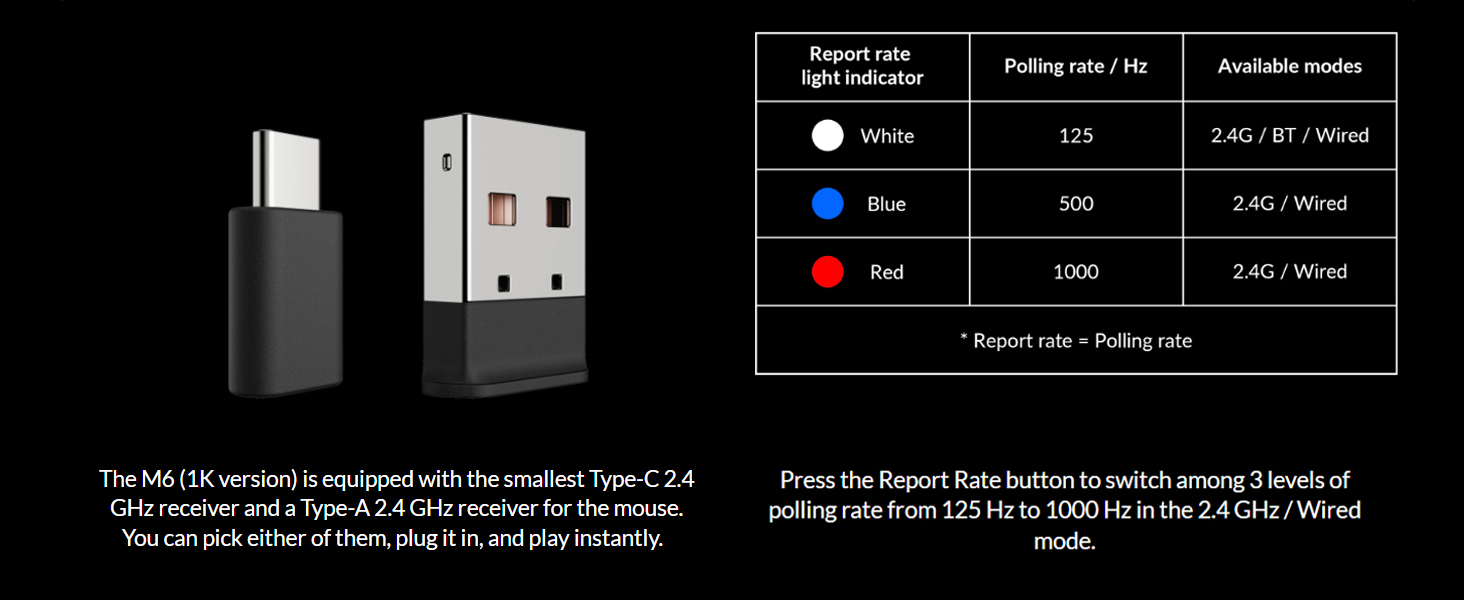
Image: A visual guide detailing the report rate light indicators (White for 125 Hz, Blue for 500 Hz, Red for 1000 Hz) and their corresponding polling rates and available connection modes.
2.4 Thumb Wheel and Tilt Wheel Functionality
The Keychron M6 features both a vertical scroll wheel and a horizontal thumb wheel, along with tilt-click functionality on the main scroll wheel, providing multiple ways of scrolling and navigation.

Image: A close-up view of the Keychron M6 mouse highlighting the horizontal thumb wheel, indicating its side-scrolling capability.
3. Maintenance
3.1 Cleaning the Mouse
To maintain optimal performance and appearance, regularly clean your Keychron M6 mouse.
- Use a soft, lint-free cloth slightly dampened with water or a mild cleaning solution.
- Avoid using harsh chemicals, abrasive cleaners, or solvents.
- Do not allow moisture to enter any openings.
- For optical sensor, use a cotton swab to gently clean the lens.
3.2 Battery Information
The Keychron M6 is equipped with an 800mAh Lithium Polymer battery, providing up to 80 hours of continuous use on a single charge.
- To preserve battery life, turn off the mouse when not in use for extended periods.
- Avoid exposing the mouse to extreme temperatures.
- If the mouse will not be used for a long time, charge it to about 50% before storing.
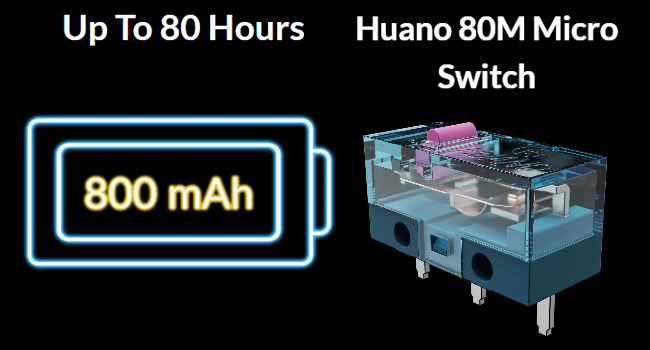
Image: Visual representation of the 800mAh battery capacity and the Huano 80M Micro Switch components within the mouse, highlighting key internal features.
4. Troubleshooting
4.1 Connectivity Issues
- 2.4 GHz Connection: Ensure the receiver is securely plugged in and the mouse is set to 'G' mode. Try a different USB port. Re-pair by pressing the pairing button on the mouse.
- Bluetooth Connection: Ensure Bluetooth is enabled on your device. Delete previous pairings and re-pair the mouse. Check if the mouse is set to 'B' mode and the correct Bluetooth channel (1, 2, or 3) is selected.
- Wired Connection: Ensure the cable is securely connected to both the mouse and the computer, and the mouse is set to 'OFF' mode. Try a different USB port or cable.
4.2 DPI/Report Rate Not Changing
- Ensure you are pressing the correct 'DPI' or 'Report Rate' button on the bottom of the mouse.
- Check the LED indicator for feedback. If no change, try restarting the mouse or your computer.
- For report rate, ensure you are in 2.4 GHz or wired mode, as Bluetooth mode may have different limitations.
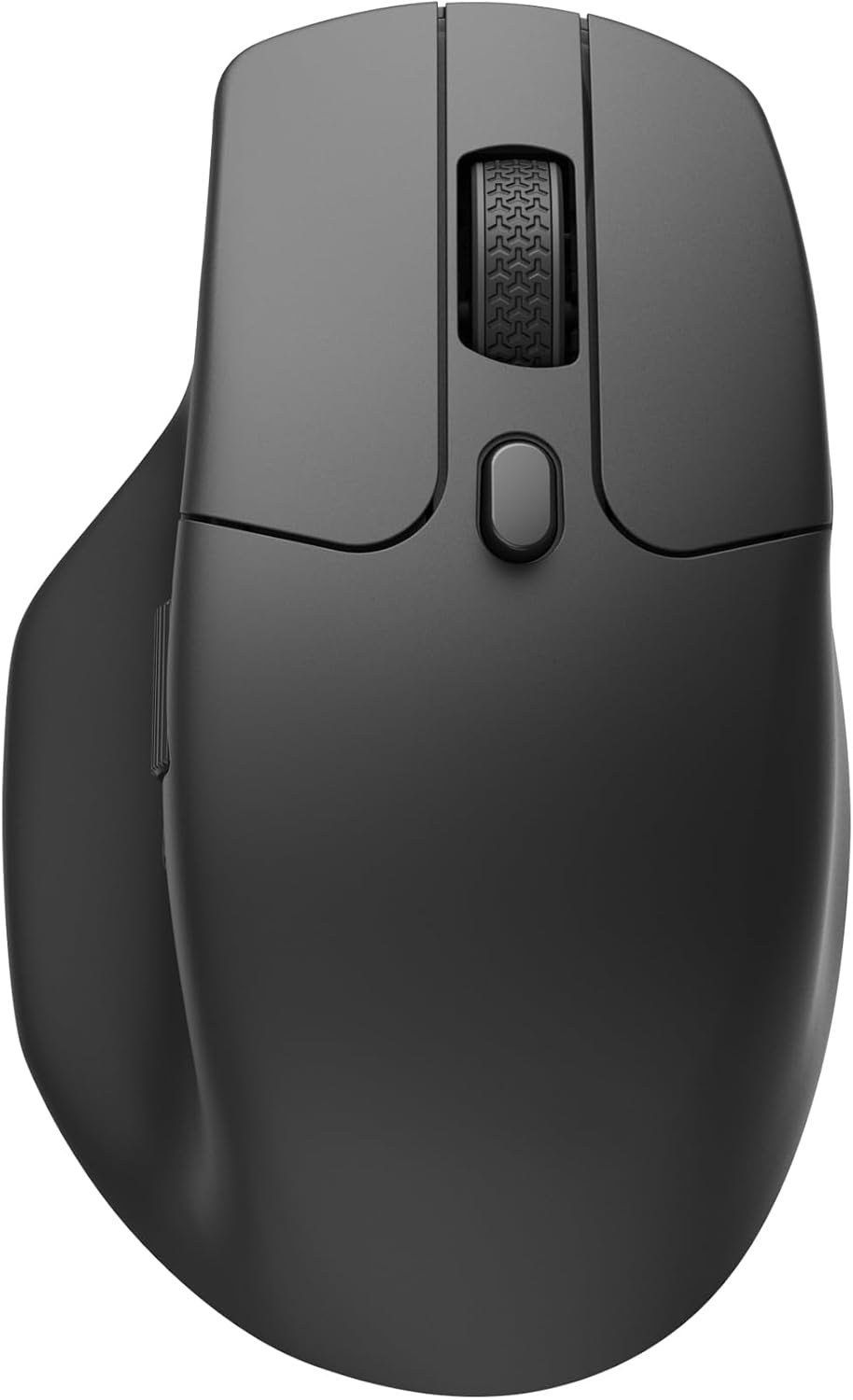
Image: The underside of the Keychron M6 mouse, clearly showing the DPI and Report Rate adjustment buttons, along with the G/OFF/B mode switch.
4.3 Scroll Wheel Issues
- If the scroll wheel feels clunky or is unresponsive, ensure no debris is lodged in the mechanism. Gently clean around the scroll wheel.
- If issues persist, try updating the mouse firmware via the Keychron Engine software.
5. Specifications
| Feature | Specification |
|---|---|
| Model Number | M6-A1-Mouse |
| Product Dimensions | 4.8 x 2.95 x 1.97 inches (122.5 x 75.4 x 50.0 mm) |
| Item Weight | 2.75 ounces (78g) |
| Sensor | PixArt 3395 Optical Sensor |
| DPI | Up to 26,000 DPI |
| IPS | Up to 650 IPS |
| Connectivity Technology | Tri-Mode: 2.4 GHz Wireless, Bluetooth 5.1, USB Wired |
| Polling Rate | 125 Hz, 500 Hz, 1000 Hz (2.4 GHz / Wired) |
| Battery | 1 Lithium Polymer battery (800mAh) |
| Battery Life | Up to 80 hours (continuous use) |
| Special Feature | Ergonomic, Lightweight, Programmable Macro Buttons, Thumb Wheel, Tilt Wheel |
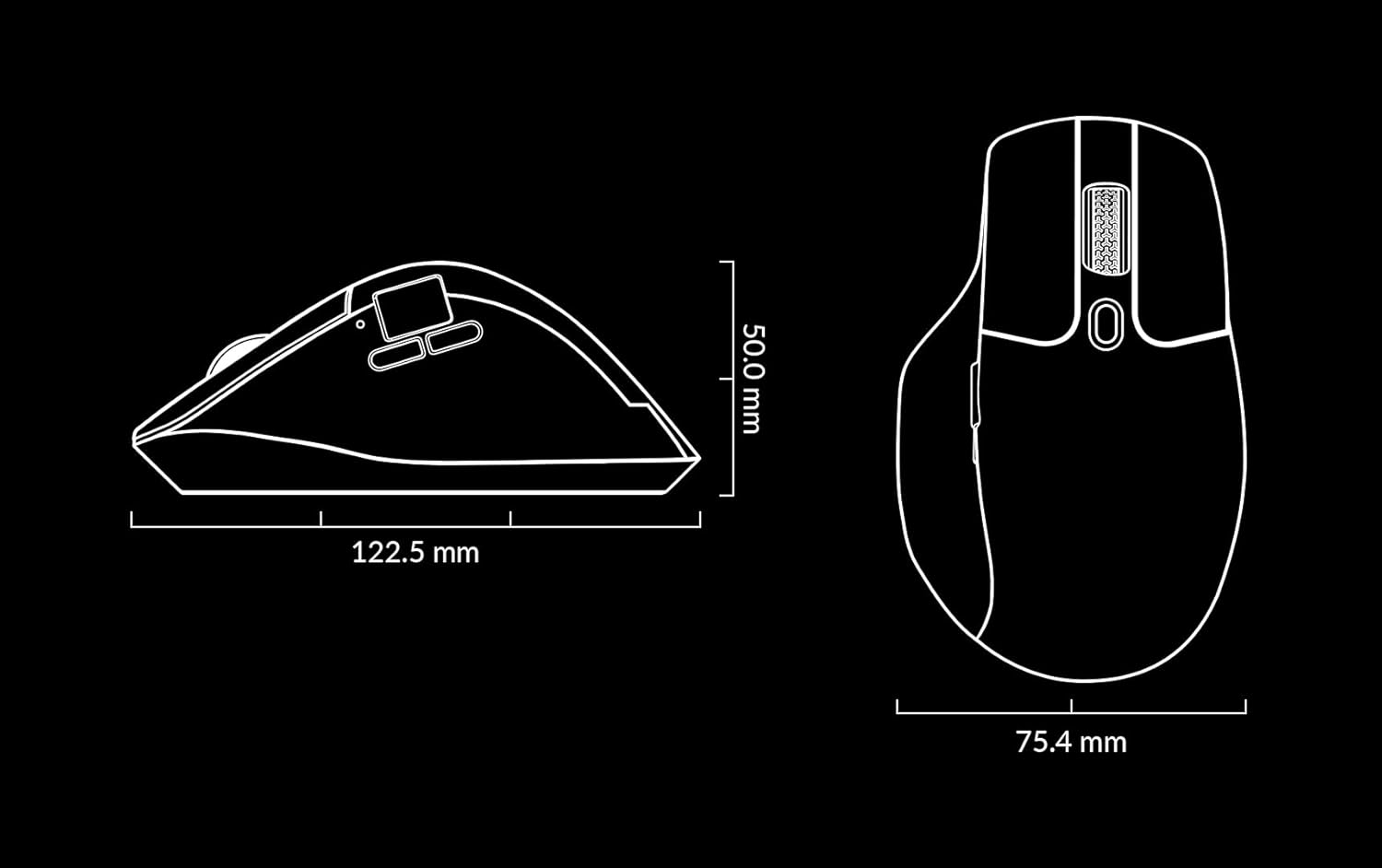
Image: Technical diagram illustrating the precise dimensions of the Keychron M6 mouse in millimeters, providing a clear understanding of its physical size.
6. Warranty and Support
6.1 Warranty Information
Keychron products are covered by a limited warranty from the date of purchase. This warranty covers manufacturing defects and workmanship. Please refer to the official Keychron website or your purchase documentation for specific warranty terms and conditions, as they may vary by region.
6.2 Customer Support
For technical assistance, troubleshooting, or warranty claims, please contact Keychron customer support through their official website. You can find FAQs, driver downloads, and contact information at www.keychron.com.